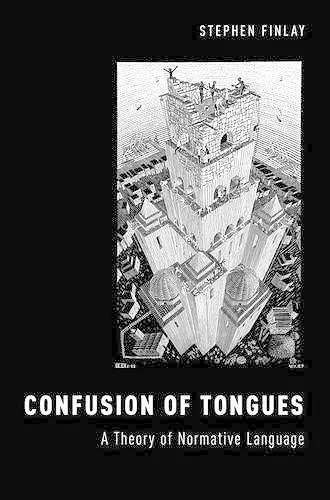Confusion of Tongues
A Theory of Normative Language
Format:Paperback
Publisher:Oxford University Press Inc
Published:8th Dec '16
Currently unavailable, and unfortunately no date known when it will be back
This paperback is available in another edition too:
- Hardback£88.00(9780199347490)

Can normative words like "good," "ought," and "reason" be defined in entirely non-normative terms? Confusion of Tongues argues that they can, advancing a new End-Relational theory of the meaning of this language as providing the best explanation of the many different ways it is ordinarily used. Philosophers widely maintain that analyzing normative language as describing facts about relations cannot account for special features of particularly moral and deliberative uses of normative language, but Stephen Finlay argues that the End-Relational theory systematically explains these on the basis of a single fundamental principle of conversational pragmatics. These challenges comprise the central problems of metaethics, including the connection between normative judgment and motivation, the categorical character of morality, the nature of intrinsic value, and the possibility of normative disagreement. Finlay's linguistic analysis has deep implications for the metaphysics, epistemology, and psychology of morality, as well as for the nature and possibility of normative ethical theory. Most significantly it supplies a nuanced answer to the ancient Euthyphro Question of whether we desire things because we judge them good, or vice versa. Normative speech and thought may ultimately be just a manifestation of our nature as intelligent animals motivated by contingent desires for various conflicting ends.
This is one of the richest, most sophisticated, and most impressive books on metaethics to have been published in my lifetime. Everyone with any interest in normative language ought to read it. Those who would seek to defend reductive naturalist views of the sort Finlay develops here will find it a treasure trove of dialectical resources that they will want to plunder repeatedly. Those who seek to attack such views or to defend rival views will find it a challenge it would be shameful to ignore. * James Lenman, LANGUAGE *
Stephen Finlay has made an indispensable contribution to our understanding of normative, evaluative, and moral language...his broadly relativist approach offers an intellectually appealing alternative * The Philosophers' Magazine *
This is a book that anyone with an interest in metaethics ought to read, and I recommend it very highly. * Analysis *
Stephen Finlay's Confusion of Tongues (COT) is an ambitious book. Its first half advances a unifying semantics for normative words, including 'good', 'ought', and 'reason'. In the second half, he argues that this semantics, combined with a single pragmatic principle, can explain the uses of such expressions of special interest to ethicists. COT's engagement with these topics is rich and complex. * Mind *
ISBN: 9780190649630
Dimensions: 234mm x 155mm x 20mm
Weight: 386g
288 pages